Stanford psychology graduate student Natalia Vélez is ‘The Science Sketcher’
Natalia Vélez, a psychology PhD student who began sketching during academic talks a year ago, has earned the nickname “The Science Sketcher” for her work, which will begin appearing regularly in the Stanford Psychology Newsletter in the 2019-20 academic year.
In high school, Natalia Vélez got in trouble for doodling during French class, even though she was drawing tiny characters speaking French – accent marks included – in miniature comic strips, using the phrases her teacher was presenting.
Go to the web site to view the video.
Vélez, who is now a PhD student in psychology in the School of Humanities and Sciences, said she scribbled in the margins of notebooks throughout elementary and high school.
“Even if I was paying attention in class, I would just be so restless,” she said during a recent campus interview in Jordan Hall, home of the Department of Psychology at Stanford. “I just always needed to do something with my hands.”
Vélez gave up her scribbling ways when she arrived at the Massachusetts Institute of Technology, where she earned a bachelor’s degree in brain and cognitive sciences in the summer of 2014. By fall that same year, she began her graduate studies at Stanford.
At Stanford, Vélez studies how children and adults vicariously explore their environment by learning from other people’s actions and advice. In her research, she uses a combination of behavioral studies with children and adults, computational modeling and neuroimaging.
Her doodling desires lay dormant until the summer of 2017, when she noticed Stanford psychology Associate Professor Michael C. Frank drawing charming portraits of speakers on his digital tablet during the annual meeting of the Cognitive Science Society in London. Frank posts his renderings, along with a thoughtful summary of the talk, on his Twitter feed.
“I thought, that looks like fun,” said Vélez, a member of the Social Learning Lab at Stanford.
A year later, with a tablet and digital pen in hand, Vélez started sketching at the 2018 Latin American School for Education, Cognitive and Neural Sciences in Chile, an annual summer gathering of students and faculty from around the world.
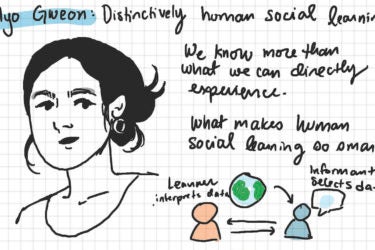
Image credit: Natalia Vélez
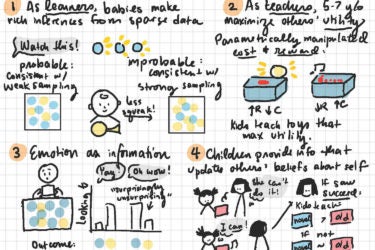
Image credit: Natalia Vélez
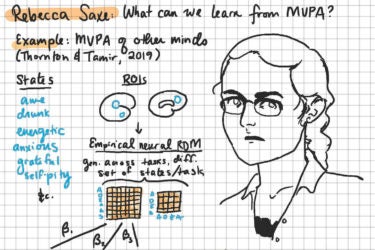
Image credit: Natalia Vélez
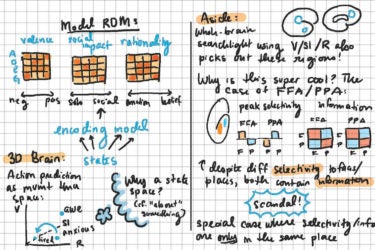
Image credit: Natalia Vélez
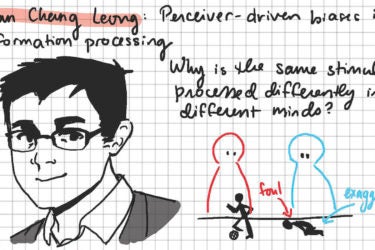
Image credit: Natalia Vélez
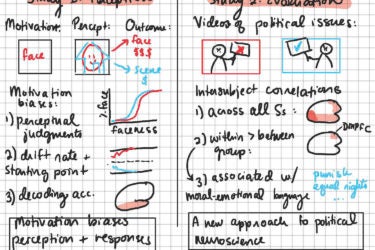
Image credit: Natalia Vélez
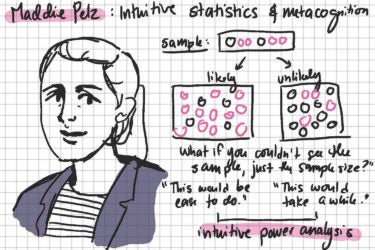
Image credit: Natalia Vélez
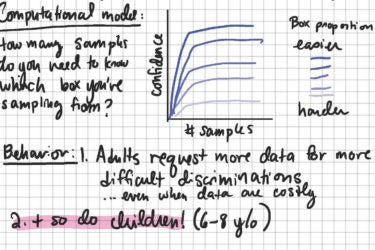
Image credit: Natalia Vélez
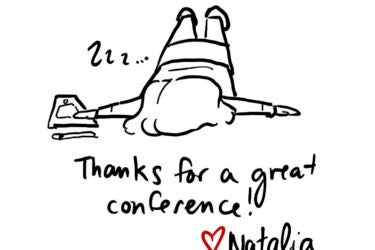
“I was super excited to go to that summer school, because about half of the participants are Latin American researchers, and the other half are Europeans and Americans,” said Vélez, who was born and raised in San Juan, Puerto Rico. “I don’t often meet other Latin American researchers in my line of work – developmental psychology and neuroscience. I was so excited to see all the amazing stuff that they’re doing and to give their work visibility by sketching their talks and posting them on my Twitter feed.”
It was the beginning of a sketching practice that continues to this day. One month after returning from Chile, Vélez sketched presentations during the 2018 gathering of the Cognitive Science Society in Wisconsin.
Since then, she has produced illustrations of department events, including colloquiums, visiting speakers and weekly department area talks focused on the five branches of psychology in which Stanford faculty specialize.
Vélez said she was relieved to discover that sketching in class – or during conference meetings – was not only accepted, but appreciated.
“Sketching has always helped me focus, but I hope it can be of some small benefit to others as well.”
—Natalia Vélez
PhD Student in Psychology
“Sketching has always helped me focus, but I hope it can be of some small benefit to others as well,” she said.
Each of her illustrations includes the title of the talk, a portrait of the speaker and notes.
Vélez posts her illustrations on her Twitter feed, @natvelali. A few people have asked for high-resolution versions to share on their lab website or to post on their Twitter feeds.
She recently returned to campus from the Island of San Servolo, Venice, home of the Neuroscience School of Advanced Studies, where she finally had the chance to draw her advisor, Hyowon Gweon, assistant professor of psychology and principal investigator of the Social Learning Lab at Stanford, giving a talk on the richness of human social learning.
“Lately, I’ve also had the chance to sketch thesis defense talks by my cohort mates, which has been fun – but also bittersweet,” she said.
Earlier this year, Vélez made her campus debut as “The Science Sketcher” in the Stanford Psychology Newsletter, which published an illustration from a PhD defense talk by Robert Hawkins, the first member of her cohort to defend his dissertation.
Vélez posted the drawing on her Twitter feed with a shout-out: “Notes from @hawkrobe’s stunning PhD defense, on how humans adapt to better understand each other. Congratulations, Dr. Hawkins!!”
Once the 2019-20 academic year begins, drawings by Vélez, including sketches of colloquium speakers, will become a regular feature of the newsletter, which celebrates the accomplishments of the department’s students, postdoctoral fellows and faculty – as well as its sketch artist-in-residence.
